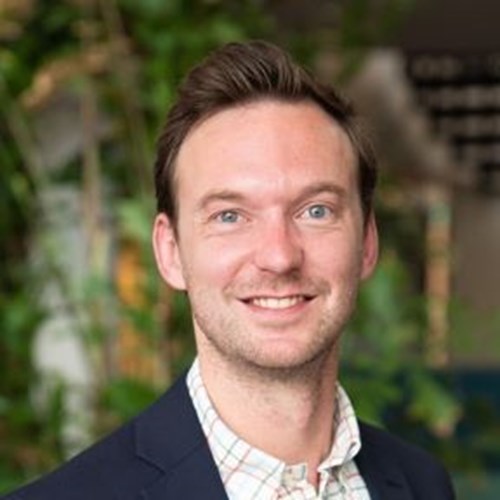A warm bath in Spain

After the necessary phone calls, video calls and emails, I am on the plane to Madrid. Together with director Richard Weurding and manager Pieter Adriaanse I visit UNESPA, the Spanish Federation. Our goal? Meet the Secretary-General Luis Miguel Ávalos, who took office this year, and catch up with President Mirenchu del Valle, who is already known to us. And of course, we don't shy away from a number of strategic topics either.
Long preparation
Three months earlier, in June, I started preparing for our working visit. Just setting a date is proving difficult. This will be followed by a consultation on the programme. What topics are important to the Covenant? And what keeps our Spanish colleagues busy?
We have plenty in common. Think of topics such as Solvency II, digitisation and open finance. Very important for the lobby. In addition, the climate and an integrated sustainability approach cannot be missed. After all, if we can share knowledge about national initiatives, we both reap the benefits.
Warm welcome
Our Spanish colleagues had made it clear to us in advance that it never rains in Madrid. They shouldn't have said that. When you arrive, it's raining. It's a nice contrast to the warm welcome that takes place in front of a museum. Big smiles. A few kisses on the cheek. Spaniards are masters at creating an informal atmosphere. I immediately feel very welcome.
Private tour
The first part of our two-day program begins. We get a private tour of an exhibition of the Spanish painter Joaquín Sorolla. Matters will not be discussed until the next day. While talking, we move through the exhibition. Judging by the paintings and the explanations, I conclude that Sorolla loved the summer and especially the beach. Many of his paintings were made from or on the beach. Sometimes both.
Informal atmosphere
There is also an informal atmosphere at the table in the evening. I love it. Both delegations are mixed at a large table. Next to me is Daniel Tomé, the Director of Legal. Within five minutes, I know how many children he has, that he lives only 30 minutes from the office and goes for a walk almost every day. He also tells me how much Madrid and the local football club mean to him. I let slip that I lived in Barcelona and pledged my heart to that local club. Despite my 'wrong choice', I am allowed to stay put.
Opportunities and expectations
It is getting late, also because Spaniards don't go to dinner until after nine, but the alarm clock is unrelenting the next day. It's 7:15 a.m. At half past 10 we are welcomed at the office of UNESPA. During breakfast, Richard, Pieter and I go through the briefing again. What are we focusing on? Where are the opportunities? What are our expectations? It is nice to be well prepared for the second part of our program.
Various presentations will follow at the UNESPA office. These include sustainability, Solvency II, Retail Investment Strategy and AI. Spain holds the presidency of the EU and, of course, UNESPA has direct links with the Spanish government. That gives us just that little bit extra of insights.
Disaster insurer
I also hear more about the national initiative Consorcio. This is a business organisation whose main task is to act effectively as a disaster insurer. Losses arising from a number of natural hazards (floods, earthquakes) and socio-political risks (e.g. terrorism) are compensated.
Interestingly, that disaster insurance is fully funded by a mandatory and relatively small markup on the premiums for property coverage and personal coverage. The handling of disasters is regulated differently than in the Netherlands.
Open finance
At the request of our Spanish colleagues, we tell you a lot about digitisation and open finance in the Netherlands. UNESPA is still in the early stages and wants to know everything about us. How did the Covenant prepare? How do we approach open finance? How does the implementation work? The penny drops quickly for me. We are going to get a lot more questions about this.
Durability
In addition to the differences, Spain and the Netherlands have one topic in common: sustainability. Both UNESPA and the Association are conducting research into the integrated approach to sustainability issues. This is not surprising, because just about every industry association is currently working on setting up an integrated sustainability approach. The big question is how you can best invest these many sustainability topics from Europe within your own association? Until about two years ago, these themes were still fairly 'departmental', but now they increasingly affect several sectors. Just think of climate adaptation, which used to apply only to damage, but now also affects mortgages and increasingly investments.
Of course, we will also share our experiences with public-private partnerships, including the climate monitor. The Spanish delegation is so interested that, back in the Netherlands, I have already been called and emailed about it a few times.
Successful visit
After more than four hours of listening and watching presentations, having conversations and sharing knowledge, we say goodbye to our Spanish friends. But not before we get three packs of ham and chorizo shoved into our hands. We leave for the airport. Our working visit has come to an end. Looking back on it now, I can only draw one conclusion: a physical visit brings a different dynamic to a conversation. You have a face with someone instead of an email address or a phone number. This allows you to have deeper conversations about European dossiers. A more than successful and instructive working visit. Vamos UNESPA!
Roy van Cooten is an adviser on European and International Affairs at the Dutch Association of Insurers
Was this article useful?
